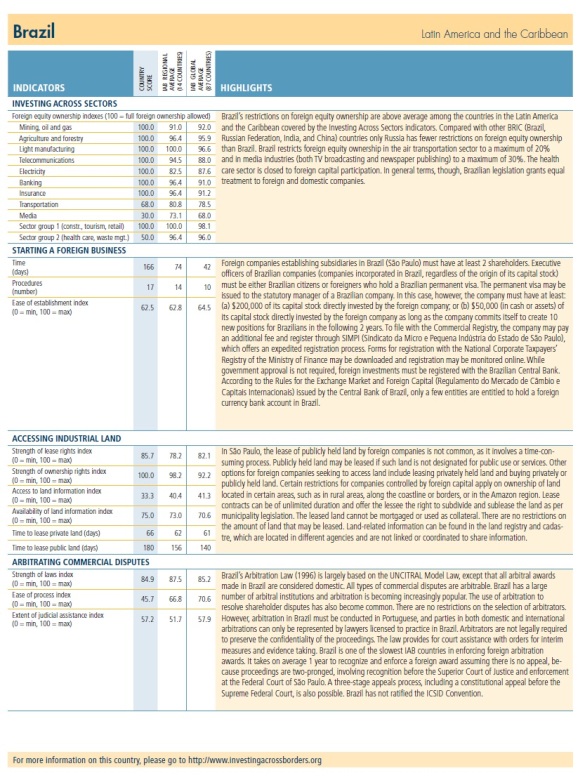
Foreign direct investment law by selected countries surveyed by the World Bank in 2010 (table 2 with the Philippines highlighted with red box). (Click the complete report in PDF)
It’s been 10 days after the 16th Congress of the Philippines started its 3-year term and as usual like the previous congresses, legislators have to pass their bills the moment a congress term starts and with the newly-opened Congress, House of Representative Speaker Feliciano “Sonny” Belmonte filed the first House resolution of the Congress calling to amend the restrictive protectionist but anachronistic economic provisions in the 1987 constitution especially the forced 60/40 forced equity sharing in favor of Filipino individuals or corporations in extracting natural resources, setting-up domestic corporations, public utilities, media, and advertising.
I am a bit disappointed with the content of the resolution wherein the 60/40 forced equity sharing will not really be scrapped, instead, Speaker Belmonte covered the 60/40 forced equity sharing with “UNLESS OTHERWISE PROVIDED BY LAW”, which means the current provision may be kept in constitutional paper but there would be more flexibility for the Congress to enact 100% foreign investment participation in mining, oil and gas extraction, manufacturing, agriculture, public utilities, media, advertising, land, and many more without too much explicit constitutional contradictions compared today. But, I think this is better with this gradual manner than none in order to silence anti foreign investment liberalization while not hampering the efforts to amend those provisions in the 1987 constitution, that is really needed for our country in order to have more inclusive and meaningful job generation and improving our dilapidated infrastructure in order for our country to move forward in this globalized economic order of today.
(Here’s the resolution of Speaker Belmonte to amend the 1987 constitution).
Foreign investors want to invest 100% then control what they invest because in the first place, the capital, technology, and ideas are theirs and also to anchor themselves from different notorious business practices all across the world including the Philippines like using dummies just to circumvent foreign investment restrictions and later on, the money will be swindled by these dummies and foreign investors cannot take the money back to them because law prohibits them from investing in particular economic sectors, thus the government will not going to protect them.
Yet, some legislators like Neri Colmenares of Bayan Muna are opposing Belmonte’s move to amend the protectionist economic provisions of the 1987 constitution for the reason that other countries have the same foreign equity ownership restrictions as ours. He even cited Brazil as one of the examples that have “strict” foreign direct investment laws than us where as far as I remember when he spoke during the public hearing about this issue, he said that Brazil only allows 25% foreign investment participation in businesses which is wrong as Brazil allows 100% foreign investment participation at MOST including mining, oil and gas extraction, manufacturing, agriculture, and public utilities, look the table below from World Bank’s Investing Across Borders 2010. (Click the complete detail)
See, Neri Colmenares has been lying to many people several times regarding this issue in whether to amend the protectionist economic provisions or not just to support his party-list agenda that he represent just to have their political survival assured in the face of increasingly globalized economic integrated, which makes their economic platform of “national industrialization” anachronistic as to set-up capital and labor intensive businesses like mining, oil and gas extraction, manufacturing, and public utilities need economic of scale to be operational that existing local conglomerates cannot fulfill nor the government as what these outdated left-leaning people have been advocating for many years.
The very point of Sonny Belmonte and many FDI liberalization advocates is this:
There should no constitutional constricts on foreign investments especially foreign investment participation. Our foreign direct investment laws should attune with the economic necessities in relative to global economic order. Putting any restrictions on foreign direct investments in the constitution especially in the 1987 constitution for the Philippine’s case, deprive any flexibility by the executive and the legislative branches of the government to adjust our FDI laws attune with a particular time without too much political noises from vested interests. Lesser or no constitutional debates in crafting FDI laws in the future mean that any investors especially foreign, will not going to have an anxiety on whether to continue invest in our economy or not.



You must be logged in to post a comment.